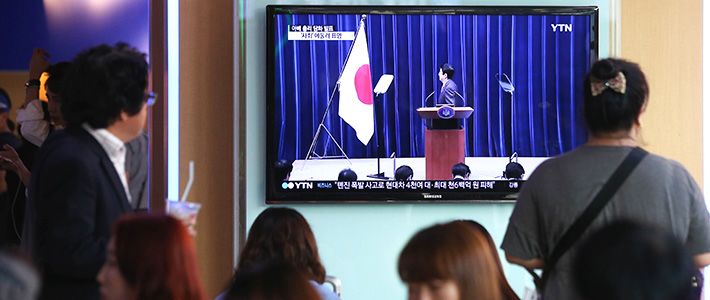
The Abe Statement: A Balancing Act That Leaves Work to Be Done
Politics Society- English
- 日本語
- 简体字
- 繁體字
- Français
- Español
- العربية
- Русский
The statement issued by the government of Prime Minister Abe Shinzō on the seventieth anniversary of the end of World War II in Asia is far longer than those by Prime Minister Murayama Tomiichi in 1995 and Prime Minister Koizumi Jun’ichirō 10 years later. And despite Abe’s stated desire to focus on the future, the statement overwhelmingly dwells on the past. These two facts reflect how challenging the so-called history problem is for Prime Minister Abe himself, and how difficult it remains for Japan.
Trying to Please Two Sides
What challenges Prime Minister Abe is his desire to reconcile two contradictory perspectives. On the one hand is his own unrepentant personal view, expressed in the past and shared by his political base in the Nippon Kaigi, a nationalist, conservative political organization. On the other hand is the forthright and apologetic stance of the fiftieth and sixtieth anniversary statements, a stance that foreign countries expected to be reaffirmed. The effort to satisfy both sides accounts for the length. It also accounts for the convoluted way all four “keywords” of past statements—invasion, colonial rule, remorse, apology—are indeed reiterated, yet indirectly and not in the prime minister’s own voice.
There was good reason to doubt the statement would go even this far. The prime minister greatly admires his grandfather Kishi Nobusuke, the wartime government leader and postwar prime minister (1957–60), who openly denied that Japan engaged in a war of aggression. Abe himself in an article in the February 2009 issue of Seiron expressed a desire to be liberated from the Murayama statement. In 2013 he also refused to describe Japan’s wartime actions as aggression. And in 2014 he initiated an official re-examination of the 1993 statement by Chief Cabinet Secretary Kōno Yōhei, which apologized for the “comfort women” system.
Despite this background, Abe’s August 14 statement acknowledges that Japan “inflict[ed] immeasurable damage and suffering” on innocent people “in China, Southeast Asia, the Pacific Islands and elsewhere.” It indirectly acknowledges that Japan engaged in “aggression” (shinryaku) and “colonial rule” by promising “never again” to engage in either act. And it affirms the “deep remorse and heartfelt apology” of Prime Minister Abe’s predecessors and the “repentance” of Japan as a whole. These phrases will be welcomed by many around the world.
Troubling for What Was Left Unsaid
The indirect recognition of invasion and the “outsourced” character of apology are frustrating. But still, the key words were spoken. The more troubling aspects of the statement are those things not said.
Two issues are at the heart of both Japan’s history of the last century and its ongoing efforts at reconciliation: responsibility for the war and responsibility for colonial rule. The government statement, like the closely related report by the Advisory Panel on the History of the Twentieth Century, presents a reasonable version of Japan’s responsibility for war. In line with the shared view of China and Japan when they normalized relations in the 1970s, the panel report blames the war on Japan’s militarists who victimized both Chinese and Japanese, and the statement implicitly agrees.
But the statement, like the report, addresses poorly the matter of colonial responsibility—a challenging area where Western nations fall short as well. It accurately credits Japan’s victory in the 1904–5 Russo-Japanese War with “encouraging” many people who suffered from colonial rule. But astonishingly, it omits the far more important fact that this war marked the start of Japan’s military occupation and subsequent colonial rule of Korea. It omits mention of the suffering of Koreans mobilized to serve the imperial cause as soldiers or laborers. It obliquely mentions the suffering of the so-called comfort women, but omits any recognition that Japan’s military created this coercive system. By praising the forgiveness offered Japan by Western nations and even China, it implicitly but unmistakably blames Koreans for failing to accept Japan’s efforts at reconciliation. This blindness to colonial responsibility has deep roots in Japan reaching back to the early twentieth century, when Japanese leaders criticized Western imperialism without recognizing any problem with Japan’s status as a power with its own colonies. Sadly, Abe’s statement echoes such views.
Looking to the future, the statement’s most significant paragraph pledges to not impose a destiny of endless apology on “our children, grandchildren, and even further generations to come, who have nothing to do with that war” and forcefully vows that “we Japanese, across generations, must squarely face the history of the past . . . in all humbleness, and pass it on to the future.” In the abstract, this is a reasonable, even admirable, position. But I fear the current generation of Japanese leaders is not inclined to convey to posterity the humble awareness of history that is needed to remove the burden of future apology. It will take wisdom and courage on the part of Japanese educators, scholars, ordinary citizens, and people around the world to give meaning to these pledges.
(Written in English on August 17, 2015. Banner photo: Korean citizens watch Prime Minister Abe's speech at Seoul Station. © Yonhap/Aflo.)
China Korea Murayama Tomiichi World War II Kono Yohei aggression Prime Minister Abe Koizumi apology remorse invasion colonial rule repentance